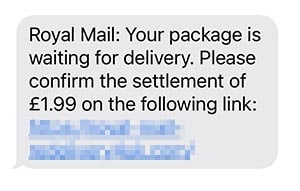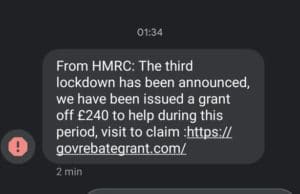There has been a sharp rise in spam text messages in 2021. Many of these texts are dangerous scams and spam that can lead to identity theft if you fall for them.
Most of these spam text messages will include a link and ask you to click on it. These links will lead to spoof websites or malicious websites. Spoof websites look legitimate and appear to belong to a trusted entity, but are controlled by crooks. Malicious websites will typically try and install malware onto your device.
To avoid all of these scams, the advice is simple. Don’t click on links in texts or emails, and never reply to them with personal information. If you’re unsure whether it’s legitimate, go straight to the relevant website (example: if the text appears to have come from PayPal, don’t click any links in a message. Go directly to PayPal.com using your internet browser.)
Here are 6 examples we’ve seen plenty of in 2021.
Scam texts claiming you need to click a link to get a parcel delivered to you have been popular text spam during 2021, largely because of a surge in online shopping. These often appear to have been sent by a courier or postal service, including Royal Mail, Hermes, Fedex, UPS, USPS and DPD.




These messages will claim you need to click a link to arrange to have your parcel delivered. They may also claim you need to pay a fee to have it shipped. Again these links lead to spoof websites that may look like an official website for a courier company, but they’re controlled by crooks and will steal your details.
Sponsored Content. Continued below...
Text messages about a tax rebate may be welcome news amid the pandemic where lots of people are struggling financially. But crooks are taking advantage of this by sending text messages asking people to click a link to receive their tax relief, only to lure those recipients to spoof websites.


Often these text messages may claim to come from a tax entity like the IRS or HMRC, or from the government. They’ll link to websites that may look official, but are actually controlled by scammers. These websites will ask for all sorts of personal and financial information, and it will all go to the crooks when you enter it.
Spam texts that claim you are eligible for a vaccination for the COVID-19 virus are also popular in 2021. These will include a link to a website that claims you need to enter your personal information or download a file to make your appointment.
However these website is malicious, and any information entered into it are stolen, or any files downloaded will likely lead to a malware infection.
Sponsored Content. Continued below...
One of the most enduring spam text messages is ones that appear to have been sent from a bank claiming there is some issue with your bank account that needs your attention. This could be a claim about an unauthorised payment, a payment you don’t recognise or a payee you don’t recognise has been added to your account.
These messages attempt to lure or panic a recipient into a clicking a link to a spoof website that looks like a bank website but it steals any login information or financial information entered into it.
And of course, in today’s times it’s not just our banks we use to make financial transactions. Sites like PayPal, Apple, Ebay and a plethora of others are also used for this purpose and will likely be used in similar scams. For example this one claiming to be from Apple about an issue with a transaction.
Sponsored Content. Continued below...
Text messages may claim that an online account you own has been locked or disabled because of security reasons, and to unlock it you need to click a link. These messages may appear to come from any company where you are likely to hold an account. For example social media sites like Facebook and Twitter or online shopping sites like Amazon. The below example appears to come from Amazon.
Again these links lead to spoof websites that will attempt to lure visitors into handing over sensitive information such as login information, which is then sent to the cyber crooks.
Most countries, including the UK and US, perform a mandatory census every few years. And 2021 was a year the UK did theirs. This provides ample opportunity for scammers to trick victims into thinking their Census information is incorrect and to lure them into clicking links that lead to spoof websites. The Census is particularly effective because it involves people giving out information about themselves, and that’s exactly what scammers want people to do (only they want people to send them information and not the government!)
Texts that threaten you about fines are going to be scams, and you should only enter information into the official government Census website. Don’t click the links on these messages.
Thanks for reading, we hope this article helped, but before you leave us for greener pastures, please help us out.
We're hoping to be totally ad-free by 2025 - after all, no one likes online adverts, and all they do is get in the way and slow everything down. But of course we still have fees and costs to pay, so please, please consider becoming a Facebook supporter! It costs only 0.99p (~$1.30) a month (you can stop at any time) and ensures we can still keep posting Cybersecurity themed content to help keep our communities safe and scam-free. You can subscribe here
Remember, we're active on social media - so follow us on Facebook, Bluesky, Instagram and X